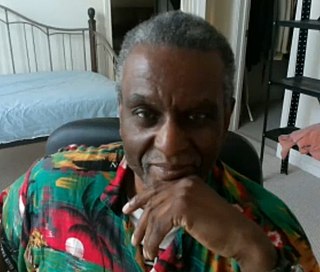A Quote by Randall Robinson
The U.S. has the largest prison population in the world: two million people. One out of every eight prisoners in the world is an African American. We are warehousing people as a profit to shareholders or for benefits to communities that get to host federal prisons. It is modern slavery. The whole future of America's black community is at risk. One out of every three young black men in Washington, D.C., is under one arm or the other of the criminal justice system. These are the continuing consequences of slavery.
Quote Topics
African
African American
America
American
Arm
Benefits
Black
Black Community
Communities
Community
Consequences
Continuing
Criminal Justice
Criminal Justice System
Eight
Every
Federal
Future
Future Of America
Get
Host
Justice
Justice System
Largest
Men
Million
Million People
Modern
Modern Slavery
Other
Out
People
Population
Prison
Prison Population
Prisoners
Prisons
Profit
Risk
Shareholders
Slavery
System
Three
Two
Using People
Washington
Whole
World
Young
Related Quotes
Slavery remained in the Deep South by other names - in prison programs with charges over nothing and eternal debt that threatened every African-American in the South right up through World War II. And that was after killing three-quarters of a million people, destroying cities, and creating hostility that exists to this day over the the Confederate flag and the racism it symbolizes, all brewing out of bitterness over a war that didn't have to happen.
The United States imprisons a larger percentage of its black population than South Africa did at the height of apartheid. In Washington, D.C., our nation’s capitol, it is estimated that three out of four young black men (and nearly all those in the poorest neighborhoods) can expect to serve time in prison.
Though the rampant racial injustices throughout the criminal justice system were offensive to me and to millions of other people, I've never drawn a tight circle around the black community to define the limits of my moral concern. But that narrative tends to get imposed on you, if you're an African-American activist.
We have seven and a half times as many people in prison. And we have eight times as many black women in prison now as we did in 1981, when I left the White House. So that's been one of the major concerns I've had as a non-lawyer, to criticize the American justice system, which is highly biased against black people and poor people. And it still is.
There are three ways in which a man becomes a slave. He may be born into slavery, or forced into it, or he can deliberately accept his servitude. All three forms flourish in the modern world. Men are born and forced into slavery in Russia and her satellites states. Men in the free world invite slavery when they ask the government to provide complete security, when they surrender their freedom to the "Welfare State."
The breakdown of the black community, in order to maintain slavery, began with the breakdown of the black family. Men and women were not legally allowed to get married because you couldn't have that kind of love. It might get in the way of the economics of slavery. Your children could be taken from you and literally sold down the river.
In the era of slavery, you could be a so-called Afro-Cuban one day and a so-called Black American the next day, or vice versa. I mean there was all this back and forth, and there was a lot of opposition in Black America to slavery in Cuba in particular, because slavery in Cuba lasted until the 1880s.
I truly believe slavery is why, as a by-product, we still have a disproportionate amount of black men incarcerated in America. It is an extension of that legacy, and that's not going to start to diminish until black people have a new sense of themselves that isn't tied to slavery and feeling inferior. I think the church can be instrumental in that, in terms of repentance, reconciliation and just being more embracing of each other - not just on Sunday, but in life generally.
































